Happy Birthday, Lillian Randolph!
When actress-singer Lillian Randolph—born on this date in 1898—got word of auditions for The Great Gildersleeve, she was working on a film soundtrack with a vocal group at Metro-Goldwyn-Mayer. Lillian stole away from the session on her lunch break and sped off to the NBC studios. Upon entering the building she tripped and literally slid up to the microphone. Randolph laughed it off and carried on reading the script as if she had rehearsed the incident beforehand. It’s been said that both her naturalness and trademark infectious laugh at this audition ultimately won her the role of Birdie Lee Coggins, housekeeper to Throckmorton P. Gildersleeve (and his niece and nephew) on the long-running radio program.
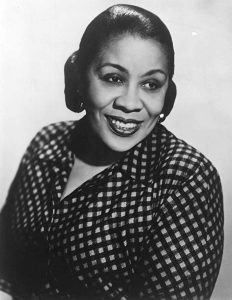 Born Castello Randolph in Knoxville, TN to a Methodist minister and teacher, Lillian got her start in show business at the age of four—singing in front of a Methodist Church congregation in Sewickley, PA. She’d later start a musical act with her older sister Amanda — and it was when she replaced Amanda in a musical revue entitled Lucky Sambo that Randolph had her stage debut. Lillian’s radio experience blossomed at Cleveland’s WTAM and later at the legendary Detroit station WXYZ. It was at WXYZ, in fact, that Randolph was schooled in “southern dialect” (despite being a Southerner) by James Jewell—the director of that station’s The Lone Ranger. While at WXYZ, Lillian co-starred on a comedy program entitled Lulu and Leander where she and fellow performer Billy Mitchell portrayed a variety of roles.
Born Castello Randolph in Knoxville, TN to a Methodist minister and teacher, Lillian got her start in show business at the age of four—singing in front of a Methodist Church congregation in Sewickley, PA. She’d later start a musical act with her older sister Amanda — and it was when she replaced Amanda in a musical revue entitled Lucky Sambo that Randolph had her stage debut. Lillian’s radio experience blossomed at Cleveland’s WTAM and later at the legendary Detroit station WXYZ. It was at WXYZ, in fact, that Randolph was schooled in “southern dialect” (despite being a Southerner) by James Jewell—the director of that station’s The Lone Ranger. While at WXYZ, Lillian co-starred on a comedy program entitled Lulu and Leander where she and fellow performer Billy Mitchell portrayed a variety of roles.
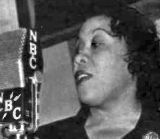 Moving to Los Angeles in 1936, Lillian Randolph would soon get regular gigs on Al Jolson’s radio show, while later appearing on Big Town and the Al Pearce and Joe Penner shows. When not busy with radio, Randolph performed in nightclubs (notably the Club Alabam) as a blues singer. Lillian also began making visits to Amos ‘n’ Andy, a program on which she played a variety of roles during its lengthy radio run. Most famously, however, she was heard as Madame Queen, Andy’s one-time fiancée. (She would later reprise Queen on the TV version of the sitcom, with sister Amanda revisiting her weekly A&A gig as Ramona Smith—the Kingfish’s mother-in-law.) In addition to her radio work, Randolph would make time for motion pictures with a screen debut in 1938’s Life Goes On. Lillian had a small part in The Duke is Tops (1938), the film that introduced Lena Horne to motion picture audiences. (When the skimpy budget on Duke wouldn’t allow Lena money for a hotel room, Lillian invited her to stay in her own home.)
Moving to Los Angeles in 1936, Lillian Randolph would soon get regular gigs on Al Jolson’s radio show, while later appearing on Big Town and the Al Pearce and Joe Penner shows. When not busy with radio, Randolph performed in nightclubs (notably the Club Alabam) as a blues singer. Lillian also began making visits to Amos ‘n’ Andy, a program on which she played a variety of roles during its lengthy radio run. Most famously, however, she was heard as Madame Queen, Andy’s one-time fiancée. (She would later reprise Queen on the TV version of the sitcom, with sister Amanda revisiting her weekly A&A gig as Ramona Smith—the Kingfish’s mother-in-law.) In addition to her radio work, Randolph would make time for motion pictures with a screen debut in 1938’s Life Goes On. Lillian had a small part in The Duke is Tops (1938), the film that introduced Lena Horne to motion picture audiences. (When the skimpy budget on Duke wouldn’t allow Lena money for a hotel room, Lillian invited her to stay in her own home.)
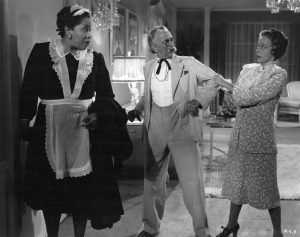 Lillian Randolph’s credited screen roles at this time include such films as Little Men (1940), West Point Widow (1941), Gentleman from Dixie (1941), All-American Co-Ed (1941), Mexican Spitfire Sees a Ghost (1942), and Hi, Neighbor (1942). A movie gig that did not credit Randolph at the time, but continues to delight scores of modern-day audiences, is her voicing of “Mammy Two-Shoes” in many of the Tom & Jerry cartoons at MGM. (Those cartoons were criticized at the time for their stereotyping, and Lillian disappeared and reappeared from the franchise until 1952.) Randolph continued to rack up celluloid credits in the likes of Three Little Sisters (1944), A Song for Miss Julie (1945), Child of Divorce (1946), The Bachelor and the Bobby-Soxer (1947), and Once More, My Darling (1949). If you make watching It’s a Wonderful Life (1946) a yearly holiday tradition in your family you’ve definitely spotted Lillian as “Annie,” housekeeper to the Bailey family.
Lillian Randolph’s credited screen roles at this time include such films as Little Men (1940), West Point Widow (1941), Gentleman from Dixie (1941), All-American Co-Ed (1941), Mexican Spitfire Sees a Ghost (1942), and Hi, Neighbor (1942). A movie gig that did not credit Randolph at the time, but continues to delight scores of modern-day audiences, is her voicing of “Mammy Two-Shoes” in many of the Tom & Jerry cartoons at MGM. (Those cartoons were criticized at the time for their stereotyping, and Lillian disappeared and reappeared from the franchise until 1952.) Randolph continued to rack up celluloid credits in the likes of Three Little Sisters (1944), A Song for Miss Julie (1945), Child of Divorce (1946), The Bachelor and the Bobby-Soxer (1947), and Once More, My Darling (1949). If you make watching It’s a Wonderful Life (1946) a yearly holiday tradition in your family you’ve definitely spotted Lillian as “Annie,” housekeeper to the Bailey family.
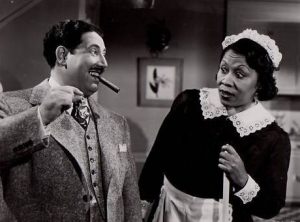 One movie franchise that made certain the name “Lillian Randolph” was in the opening credits was the short-lived The Great Gildersleeve film series based on the popular radio sitcom. Lillian was the only radio regular besides Harold Peary to appear in all four Gildersleeve movies: The Great Gildersleeve (1942), Gildersleeve’s Bad Day (1943), Gildersleeve on Broadway (1943), and Gildersleeve’s Ghost (1944). In fact, Randolph was the only member of the Gildersleeve cast to appear on the radio, film, and TV series (a syndicated show that aired in the 1955-56 season). Old-time radio historian John Dunning once described Lillian’s “Birdie” as “perhaps the most endearing in radio’s long parade of Negro maids, cooks, and housekeepers. She had genuine warmth, an infectious laugh, and a heart as big as the great man’s midsection. She also had a feisty side, being fully capable of deflating Gildersleeve’s ego.” When the situation presented itself, Randolph’s presence on The Great Gildersleeve also allowed to showcase what a fine singer she was.
One movie franchise that made certain the name “Lillian Randolph” was in the opening credits was the short-lived The Great Gildersleeve film series based on the popular radio sitcom. Lillian was the only radio regular besides Harold Peary to appear in all four Gildersleeve movies: The Great Gildersleeve (1942), Gildersleeve’s Bad Day (1943), Gildersleeve on Broadway (1943), and Gildersleeve’s Ghost (1944). In fact, Randolph was the only member of the Gildersleeve cast to appear on the radio, film, and TV series (a syndicated show that aired in the 1955-56 season). Old-time radio historian John Dunning once described Lillian’s “Birdie” as “perhaps the most endearing in radio’s long parade of Negro maids, cooks, and housekeepers. She had genuine warmth, an infectious laugh, and a heart as big as the great man’s midsection. She also had a feisty side, being fully capable of deflating Gildersleeve’s ego.” When the situation presented itself, Randolph’s presence on The Great Gildersleeve also allowed to showcase what a fine singer she was.
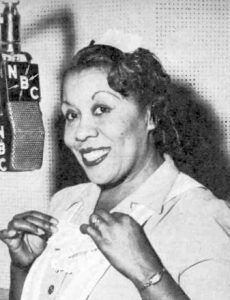 Gildersleeve was not the only radio program that put groceries on Lillian Randolph’s table. She appeared with Edna May Oliver on The Remarkable Miss Tuttle, a summer sitcom replacement for Jack Benny’s show in 1942. She also had regular gigs on The Baby Snooks Show (as Mrs. Watson) and The Billie Burke Show (as Daisy). Other programs on which Lillian appeared include The Cavalcade of America, Command Performance, Dr. Christian, Everything for the Boys, The Hallmark Hall of Fame, The Hour of St. Francis, Jubilee, The Lady Esther Screen Guild Theatre, and The Lux Radio Theatre. In November of 1951, Randolph took over the title role of radio’s Beulah from Hattie McDaniel when McDaniel became too ill to perform. (McDaniel passed away in October of 1952). Beulah’s creative team had wanted Lillian’s sister Amanda to play the part, but a clause in Amanda’s Amos ‘n’ Andy contract kept her from taking on that assignment until the fall of 1952. (Amanda’s A&A contract was re-negotiated.)
Gildersleeve was not the only radio program that put groceries on Lillian Randolph’s table. She appeared with Edna May Oliver on The Remarkable Miss Tuttle, a summer sitcom replacement for Jack Benny’s show in 1942. She also had regular gigs on The Baby Snooks Show (as Mrs. Watson) and The Billie Burke Show (as Daisy). Other programs on which Lillian appeared include The Cavalcade of America, Command Performance, Dr. Christian, Everything for the Boys, The Hallmark Hall of Fame, The Hour of St. Francis, Jubilee, The Lady Esther Screen Guild Theatre, and The Lux Radio Theatre. In November of 1951, Randolph took over the title role of radio’s Beulah from Hattie McDaniel when McDaniel became too ill to perform. (McDaniel passed away in October of 1952). Beulah’s creative team had wanted Lillian’s sister Amanda to play the part, but a clause in Amanda’s Amos ‘n’ Andy contract kept her from taking on that assignment until the fall of 1952. (Amanda’s A&A contract was re-negotiated.)
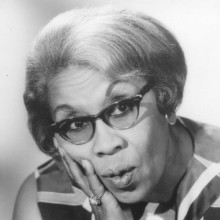 The 1950s would see Lillian Randolph working on both the radio and TV versions of The Great Gildersleeve and Amos ‘n’ Andy while appearing in such films as That’s My Boy (1951), Dear Brat (1951), and Bend of the River (1952). Lillian continued to work on the small screen with guest appearances on Ben Casey and The Bill Cosby Show (as Cos’ character’s mother) and films like Hush…Hush, Sweet Charlotte (1964) and The Great White Hope (1970). Randolph closed out the 70s with work on Sanford and Son, The Jeffersons, and Roots (as Sister Sara) with her silver screen swan song a nice turn in The Onion Field (1979). She passed away in 1980 at the age of 81…and fittingly, is buried next to her sister Amanda (in Forest Lawn).
The 1950s would see Lillian Randolph working on both the radio and TV versions of The Great Gildersleeve and Amos ‘n’ Andy while appearing in such films as That’s My Boy (1951), Dear Brat (1951), and Bend of the River (1952). Lillian continued to work on the small screen with guest appearances on Ben Casey and The Bill Cosby Show (as Cos’ character’s mother) and films like Hush…Hush, Sweet Charlotte (1964) and The Great White Hope (1970). Randolph closed out the 70s with work on Sanford and Son, The Jeffersons, and Roots (as Sister Sara) with her silver screen swan song a nice turn in The Onion Field (1979). She passed away in 1980 at the age of 81…and fittingly, is buried next to her sister Amanda (in Forest Lawn).
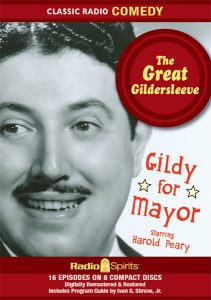 Radio Spirits features plenty of The Great Gildersleeve collections showcasing Lillian Randolph in her signature radio role of Birdie. Our newest offering is Gildy for Mayor! (with liner notes by yours truly), but you can also put past releases like Family Man, For Corn’s Sake, and Neighbors in your online cart. Our potpourri compendiums of Great Radio Christmas, Great Radio Comedy, and Great Radio Sitcoms also feature vintage Gildersleeve broadcasts with Ms. Randolph. Last—but certainly not least—you’ll hear Lillian in the Amos ‘n’ Andy sets Radio’s All-Time Favorites and Volume Two. Happy birthday, Lillian!
Radio Spirits features plenty of The Great Gildersleeve collections showcasing Lillian Randolph in her signature radio role of Birdie. Our newest offering is Gildy for Mayor! (with liner notes by yours truly), but you can also put past releases like Family Man, For Corn’s Sake, and Neighbors in your online cart. Our potpourri compendiums of Great Radio Christmas, Great Radio Comedy, and Great Radio Sitcoms also feature vintage Gildersleeve broadcasts with Ms. Randolph. Last—but certainly not least—you’ll hear Lillian in the Amos ‘n’ Andy sets Radio’s All-Time Favorites and Volume Two. Happy birthday, Lillian!

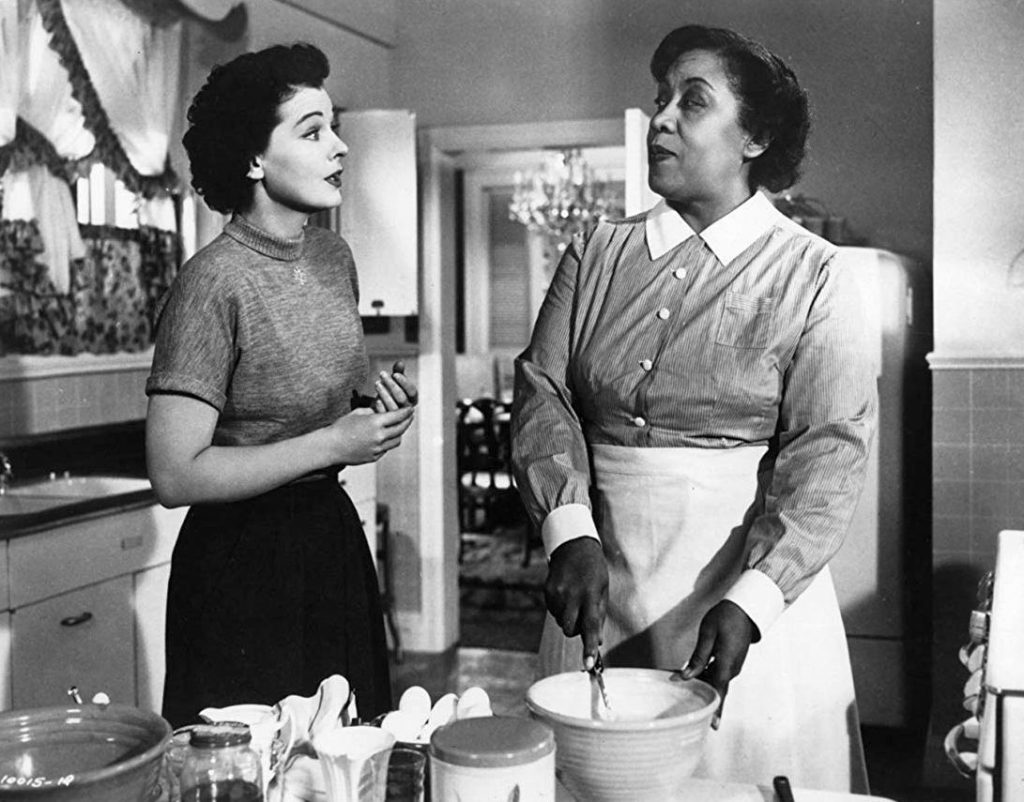

Thanks for all the hard work in compiling these wonderful Bio’s!!